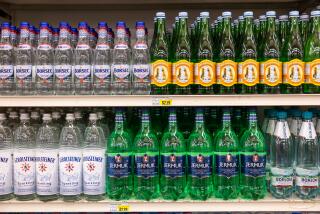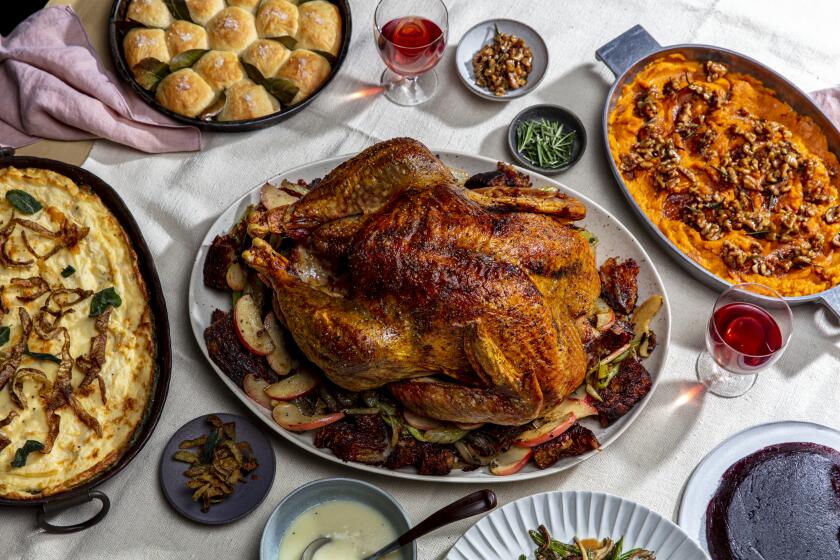Growing the grapes of peace
WINEGROWING is an act of hope. People who engage in it have to be optimists, trusting that over the years their vines will strengthen, their fruit will improve, their wines will age into more harmonious creations.
Optimism of any kind, you would think, must be in short supply in Israel these days, what with that countryâs economy limping, the intractable conflict with the Palestinians harrowing everyday life and the American war on Iraq thundering in the region.
Nonetheless, Golan Heights Winery, whose Yarden line is the most widely exported of Israelâs premium wines, toils confidently along. In the face of present woes and future uncertainties, it continues to bring new vineyards and wines on line, from territory conquered from Syria in the 1967 Six-Day War and still claimed by Syria. The winery in Katzrin hopes to double its exports to the U.S., currently 30,000 cases a year, in the next two or three years, according to chief winemaker Victor Schoenfeld.
The 39-year-old Schoenfeld grew up on the Palos Verdes Peninsula and was educated in enology at UC Davis. Awaiting the birth of his first child, a son, at any moment, he exudes a California sunniness not only about Yardenâs prospects, but about the winemaking life in the isolated Golan Heights, which is distant from the Palestinian populations of the West Bank and Gaza Strip.
âIf we didnât listen to the news or read the newspapers, weâd have no idea of whatâs going on in the rest of the country,â he says during a recent visit to the Los Angeles area. âOur day-to-day lives are unaffected. Thatâs not to say our market isnât affected. Restaurants in Israel are hurting and tourism is down. Still, weâve increased our sales by 10% in Israel over the last two years.â
The war in Iraq began shortly after Schoenfeld returned to Israel. But even that is having minimal impact on life at the winery.
âNothing has changed in our area, except most people have a gas mask in the trunk of their car, just in case,â he said by e-mail this week. âThe northern border is a bit tense due to fears that Hezbollah might fire rockets or missiles into the north, but they donât land in the Golan.â
*
A dozen vineyards
Schoenfeld signed on at Golan Heights Winery in 1991, after working at Preston, Chateau St. Jean, Sonoma Creek and Robert Mondavi wineries in California. During his tenure, Golan Heightsâ vineyard acreage has expanded from about 350 acres to nearly 1,500. More than 300 acres are coming into production for the first time this year. It also recently established an experimental winery, and has begun growing grapes organically.
The wineryâs dozen vineyards are scattered from near the Sea of Galilee north to the foot of snowcapped Mt. Hermon. They exist at elevations ranging from 1,200 to 4,500 feet above sea level, where the air is cool and the sunlight intense. âIsraelâs latitude is a bit too far south for easily getting great wine grapes,â Schoenfeld explains, âso we go up.â
The Golan Heightsâ elevation makes it the most promising of Israelâs five winegrowing regions. By contrast with those in the countryâs coastal vineyards, grapes in the heights achieve greater levels of the acidity necessary for more balanced, elegant wines.
Israel claims to be one of historyâs earliest producers of wine. The Old Testament identifies the grape as one of seven blessed species of fruit. Wine production ceased in the 7th century with the rise of Islam in the region, however, and was not resumed in earnest until the late 1880s, when Baron Edmond de Rothschild (of Chateau Lafite fame) donated 60 million francs to restart the areaâs wine industry.
From that gift arose the giant cooperative that produces Carmel wines, which claim 60% of the domestic Israeli market. Carmel produces primarily sweet, sacramental wines and lower-quality table wines, familiar to kosher shoppers in the U.S. Carmel and Yarden account for the bulk of Israeli wine that is exported.
Golan Heights Winery, which is owned by a consortium of eight kibbutzim and farm cooperatives, is a prime example of the Israeli industryâs shift away from traditional sweet and off-dry wines toward international-style dry table wines. Israel is not much of a wine-drinking country. Its per-capita consumption is roughly half that of the United States, which is itself not a prolific consumer of wine. Thus, Schoenfeld says, Golan Heights must look to the export market, where its Yarden wines are meant to compete with those from France, Italy, the United States and elsewhere.
An L.A. Times panel of tasters recently sampled the eight locally available Yarden wines. They are Mount Hermon Red and White table blends (about $9 a bottle), varietal wines of Chardonnay ($21), Sauvignon Blanc and Merlot ($17 each), Cabernet Sauvignon ($21) and an ice wine (called HeightsWine, about $17 a half-bottle) made from Gewurztraminer grapes frozen solid in the winery before being crushed.
Over all, the tasters found the wines clean and well made, though some were not intensely flavorful. Attracting the highest praise were the 2000 Katzrin Chardonnay and the inky 1999 Cabernet Sauvignon. The wines are available at Greenblattâs Liquor in West Hollywood, Larchmont Village Wines, the Wine House in West L.A., and in numerous kosher markets.
The Chardonnay, Schoenfeld says, is poured at Thalia in New York City and has made the wine list at Charlie Trotterâs in Chicago.
Despite their character, Yarden wines in the United States face the challenge of escaping the kosher ghetto. They are most readily found in kosher stores and in the kosher sections of wine shops, which tends to identify them in consumersâ minds with sweet kosher fare, such as Mogen David and Manischewitz.
*
Not strictly kosher
The wines have almost the exact opposite problem in Israel. Yarden wines are not pasteurized, which means strictly Orthodox Jews do not consider them kosher, even though they are made, Schoenfeld says, in accordance with all other kosher requirements regarding ingredients and handling, including rabbinical supervision of production.
Schoenfeld says pasteurization is the norm in Israel primarily because it enables non-Jews and nonobservant Jews, who account for most waiters in Israeli restaurants, to pour the wines for Orthodox customers.
âWe actually lose out on some of the kosher wine market as a result,â Schoenfeld says. âKosher producers pasteurize their wines for marketing reasons and not for quality reasons. If there was a real quality benefit, you can bet that the practice would be widespread in the high-quality wine industry, but it simply is not. Wine is incredibly delicate, and everything we do to it affects the final product. Bringing wine to a near-boiling temperature has to have a negative effect.â
A major sector of the Israeli market for Yarden includes high-end restaurants, he says. Such restaurants are not kosher, and the competition the winery faces there is the same it must contend with in other countries, namely, wines from the rest of the world.
The incongruity of making wine, a peaceful pursuit, on disputed land that was conquered by arms, is not lost on Schoenfeld.
Syria has insisted that any final peace with Israel must entail the return of the Golan Heights. But the winemaker says he doesnât dwell on the possibility of losing the fruit of more than 35 years of Israeli labor. âWeâre concentrating on making high-quality wine. The future is anybodyâs guess. In â94 and â95, when it looked like there was going to be peace with Syria at any moment, we said, âWeâll do what we do and let the politicians do what they do.â And, looking back, it was a good idea that we expanded.â Besides, he says, if true peace ever were achieved, why couldnât Israelis own a winery in a neighboring country?
More to Read
Eat your way across L.A.
Get our weekly Tasting Notes newsletter for reviews, news and more.
You may occasionally receive promotional content from the Los Angeles Times.










